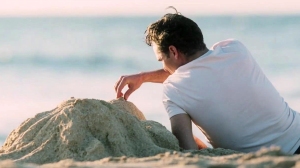Is Amour really about love? ‘Cause I’m not feeling it. Haneke’s films are secretive, elegant and cold. He is a master of his art, and nothing demonstrates this better than his casting of Emmanuelle Riva and Jean-Louis Trintignant: just watching them is a pleasure and a privilege. Moreover, they bring with them the intertextual connotations and freight of all the roles they have played before. Yet, for me, even they do not deflect the cold touch of the filmmaker’s gaze (excuse the synaesthesia). Critics applaud Haneke’s cool, intellectual detatchment, and his flawless mise en scene, but I remain undecided about whether I wholeheartedly admire his films or not.
On the topic of masters, I enjoyed The Master. Early on in the movie we see the image of a woman, made out of sand.* Freddie Quell (Joaquin Phoenix) mimes sexual acts with this woman-made-of-sand (which is metaphorically what he continues to do throughout the movie). Around him, sailors, who could have stepped out of Kenneth Anger’s 1947 homoerotic short film Fireworks, frolic by the sea. Thus, from the outset, the film problematises both femininity and masculinity. It helps that the world of this scene is steeped in South Pacific, another film which is preoccupied with how men imagine women and how the two might co-exist.

It is easy to miss, because there is so much else going on at the same time, but this movie insistently considers different versions of twentieth century womanhood. In a later sequence, pretty young women parade through a department store wearing synthetic gowns. They sport large price tags. Note, the tags are large, the prices small. What’s for sale, the woman or the dress? As much as it is a film centered on a relationship between two men, women loom large and problematic in The Master. I must mention Peggy Dodd (Amy Adams), monumentally pregnant for much of the film, she keeps a sharp eye – and hand – on her husband, Lancaster Dodd (Philip Seymour Hoffman). Peggy becomes an ambivalent maternal presence as the movie unfolds, at once steely and vulnerable, by turns nurturing and controlling.
Because of a prolonged cold, I haven’t been to the cinema since seeing these two substantial pieces. Maybe it was Amour that gave me the chill.
* This does not bode well; we all know what happened to the house that Jack built.
Leave a comment